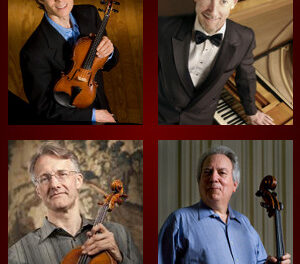Dear readers, I’m at a loss. I’ve spent the last 36 hours or so in a state of wonder and despair: wonder at the level of music-making I witnessed Thursday night at Wake Forest University’s Brendle Recital Hall, and despair at the prospect of having to somehow write about it. Now, having finally made up my mind that I can’t write a review of that music, and that a review wouldn’t do it justice anyway, I’m resorting to presenting the concert to you as I experienced it and as I now remember it: a choppy, blinding, non-linear succession of extraordinary sounds and images. Forgive me, and enjoy.
- There were many, many professional musicians in that audience – as many as I can ever remember seeing at a concert.
- The players – cellist David Finckel, pianist Wu Han, and violinist Philip Setzer – looked far too comfortable on stage for the act that they were undertaking. At times I almost thought they looked bored, but eventually the vague effect of their demeanor and movements resolved into something more like “content.” They looked about as nervous to be playing Beethoven for a large and discriminating audience of musicians as they would if they were sitting on the couch, sipping a cold brew.
- Finckel’s tone was extremely bright and present, very different from the dark and woody cellos we’re all used to hearing. His presence was reinforced by the deep resonance of Wu Han’s expressive pedaling. Strangely, Setzer’s violin formed a bridge between the two – singing, but also breathy and sweetly resonant, like a mandolin.
- Han had an extraordinary way of lifting the sustain pedal slowly, letting the notes taper off rather than slam shut. When I try to do that, the notes buzz and die away in a most uneven fashion – a very well-adjusted piano and a great pianist.
- In terms of the scoring and sound-image achieved by the composer, each trio sounded better than the last. Op. 1 no. 2 was vigorous and overflowing, so much so that the instruments very often got in each other’s way. Op. 70 no. 2 burst forth in three-dimensional contrast, the instruments each fully audible even in dense climaxes. Op. 97 was the most judiciously scored, with each instrument weaving in and out of the texture as needed. The sound of the individual instruments also changed noticeably over the evening. Probably a combination of factors: heating up under the stage lights, changing key areas, more supple and expressive writing on the part of the composer, and different approaches to the different pieces on the part of the players.
- The playing was, unsurprisingly, world-class. Han’s dynamic control was jaw dropping. She might as well have been plucking the strings with her fingers. Setzer and Finckel intonated with each other not just well, but beautifully. This should be, again, unsurprising. These two veterans of the Emerson Quartet have pondered the mysteries and vagaries of intonation all their lives. Somehow, it’s still astonishing to hear the results in the flesh.
- The mistakes deserved applause. Seriously. Like when you watch a professional golfer barely miss a long birdie put on the high side, and you knowingly clap with respect for the brilliant effort and the well-earned par. Let’s not even call them mistakes, but rather admirable deviations from impossible perfection.
- Han viewed her score on a tablet, turning pages with a remote control next to the soft pedal. The blue glow reflecting on her face contrasted strangely with the golden glow of the stage lights on the other performers.
- From my seat in the front row, I could very clearly hear Finckel quietly stopping notes with his left hand moments before bowing them, to check his position and intonation. This is a common practice with strings, but it was somehow human and touching in this instance. There may be some magic to being world-class, but nothing beats solid mechanics.
- Before they began playing, Han mentioned that Beethoven had died during a performance (across town) of his Op. 1 no. 2, probably during the slow movement. She said that since she had learned this fact, she always shed a tear when playing or listening to this movement. I watched the performers closely for hints of extra emotion or effort during the Largo. There wasn’t any. From beginning to end, they were comfortably aware, their efforts sustained and applied.
- The performers’ bows were gracious and humble, and the first shows of emotion during the concert. They positively glowed as the audience, on its feet, applauded and demanded three returns to the stage. Repeatedly, they put their hands together and nodded in a show of appreciation for our enthusiasm. They were clearly, honestly thankful. And so were we.











